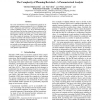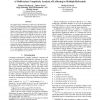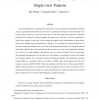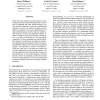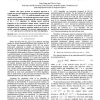160
click to vote
AAAI
2012
13 years 4 months ago
2012
The early classifications of the computational complexity of planning under various restrictions in STRIPS (Bylander) and SAS+ (B¨ackstr¨om and Nebel) have influenced followin...
143
click to vote
AAAI
2012
13 years 4 months ago
2012
We extend work by Christian et al. [Review of Economic Design 2007] on lobbying in multiple referenda by first providing a more fine-grained analysis of the computational comple...
171
click to vote
Publication
A large class of systems of biological and technological relevance can be described as analog networks, that is, collections of dynamic devices interconnected by links of varying s...
144
click to vote
PR
2011
14 years 4 months ago
2011
The existing Multi-View Learning (MVL) learns how to process patterns with multiple information sources. In generalization this MVL is proven to have a significant advantage over...
161
click to vote
FOGA
2011
14 years 5 months ago
2011
Analyzing the computational complexity of evolutionary algorithms (EAs) for binary search spaces has significantly informed our understanding of EAs in general. With this paper, ...
112
click to vote
IJCAI
2003
15 years 3 months ago
2003
There has been significant recent progress in reasoning and constraint processing methods. In areas such as planning and finite model-checking, current solution techniques can h...
134
click to vote
AAAI
2004
15 years 3 months ago
2004
In this paper, we present a general technique for taking forward-chaining planners for deterministic domains (e.g., HSP, TLPlan, TALplanner, and SHOP2) and adapting them to work i...
153
click to vote
STACS
1993
Springer
15 years 6 months ago
1993
Springer
Abduction is an important form of nonmonotonic reasoning allowing one to find explanations for certain symptoms or manifestations. When the application domain is described by a l...
124
click to vote
ICC
2007
IEEE
15 years 8 months ago
2007
IEEE
This paper presents an analytical approach to evaluate the expected complexity of a generalized sphere decoding (GSD) algorithm, GSDλ − , for underdetermined integer leastsquare...
